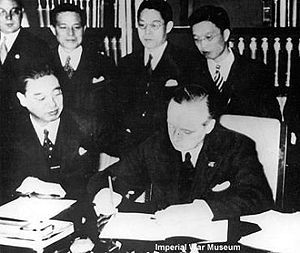
Japanese ambassador to Germany Viscount Kintomo Mushakoji and foreign minister of Germany Joachim von Ribbentrop sign the Anti-comintern pact on November 25, 1936 in Berlin.
Historyguy.com

Japanese ambassador to Germany Viscount Kintomo Mushakoji and foreign minister of Germany Joachim von Ribbentrop sign the Anti-comintern pact on November 25, 1936 in Berlin.
What Was The Anti-Comintern Pact? The Anti-Comintern Pact of was an agreement between Germany and the Empire of Japan. The two nations, each ruled by right-wing, anti-Communist dictatorships, agreed to mutually resist Communism and Communist states. This was an explicit treaty of alliance agains the Soviet Union. The 1939 Molotov-Ribbentrop Agreement (formally titled The Treaty of Non-aggression between Germany and the Union of Soviet Socialist Republics) caused a breach between Germany and Japan, and Japan did not declare war on the Soviet Union when Germany invaded the Communist nation in 1941. Germany and Japan (also joined by Italy as the Axis Powers), did act as partners against the Western Powers in Wold War Two.
Text of the Anti-Comintern Pact of 1936(English translation) Agreement Guarding Against the Communistic International
The Imperial Government of Japan and the Government of Germany,
In cognizance of the fact that the object of the Communistic International (the so-called Komintern) is the disintegration of, and the commission of violence against, existing States by the exercise of all means at its command,
Believing that the toleration of interference by the Communistic International in the internal affairs of nations not only endangers their internal peace and social welfare, but threatens the general peace of the world,
Desiring to co-operate for defense against communistic disintegration, have agreed as follows.
Article I
The High Contracting States agree that they will mutually keep each other informed concerning the activities of the Communistic International, will confer upon the necessary measure of defense, and will carry out such measures in close co-operation.
Article II
The High Contracting States will jointly invite third States whose internal peace is menaced by the disintegrating work of the Communistic International, to adopt defensive measures in the spirit of the present Agreement or to participate in the present Agreement.
Article III
The Japanese and German texts are each valid as the original text of this Agreement. The Agreement shall come into force on the day of its signature and shall remain in force for the term of five years. The High Contracting States will, in a reasonable time before the expiration of the said term, come to an understanding upon the further manner of their co-operation.
In witness whereof the undersigned, duly authorized by their respective Governments, have affixed hereto their seals and signatures.
Done in duplicate at Berlin, November 25th, 11th year of Showa, corresponding to November 25th, 1936.
Viscount Kintomo Mushakoji
Imperial Japanese Ambassador Extraordinary and Plenipotentiary
Joachim von Ribbentrop German Ambassador Extraordinary and Plenipotentiary
Source:
"The History Guy" is a Registered Trademark.
History Guy SiteMap